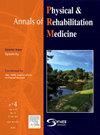未满足的康复需求是否与COVID-19期间的健康恶化有关?对加拿大残疾人的横断面研究
IF 4.6
3区 医学
Q1 REHABILITATION
Annals of Physical and Rehabilitation Medicine
Pub Date : 2025-06-19
DOI:10.1016/j.rehab.2025.101995
引用次数: 0
摘要
2019年冠状病毒病(COVID-19)大流行扰乱了康复服务,对患有长期疾病或残疾的个人造成了不成比例的影响。然而,未满足的康复需求对这一人群的健康影响仍未得到充分探讨。目的了解新冠肺炎第一波疫情期间加拿大长期疾病或残疾患者未满足的康复需求与自我感觉健康恶化之间的关系。方法:我们分析了加拿大统计局(Statistics Canada)于2020年6月23日至7月6日进行的全国性众包横断面调查。参与者包括13483名年龄在15岁及以上的加拿大人,他们报告有长期疾病或残疾。未满足的康复需求(自变量)定义为由于大流行需要但未接受物理治疗/按摩治疗/脊椎按摩服务、语言或职业治疗、咨询或支持团体。与大流行前的水平相比,自我报告的健康恶化(因变量)为“严重得多”或“有些恶化”。我们使用修正泊松回归计算校正患病率比(aPR)和95%置信区间(CI),控制社会人口因素和其他未满足的医疗需求,包括COVID-19未满足的医疗关注。分析按年龄组、性别和居住地进行分层。结果总体而言,47%的参与者报告在大流行的早期阶段健康状况恶化。在健康状况恶化的人中,59%的人报告说,由于大流行,康复需求未得到满足。无论社会人口学特征和其他未满足的医疗保健需求如何,未满足康复需求的患者报告健康恶化的可能性要高出33%(调整后的PR = 1.33, 95% CI 1.27-1.40)。这些关联在不同年龄组、性别和居住地点都是一致的。结论在加拿大长期残疾患者中,未满足康复需求与自我感知健康恶化相关。解决这些未满足的需求对于改善突发公共卫生事件期间的健康结果和生活质量至关重要。在大流行后时代,改善获得康复服务的机会并更好地将康复服务纳入更广泛的卫生保健系统,对于支持这一人群的福祉和恢复功能仍然至关重要。数据库注册不适用。这项研究涉及对加拿大统计局收集的公开可用的、去识别的国家数据集的二次分析。本文章由计算机程序翻译,如有差异,请以英文原文为准。
Were unmet rehabilitation needs associated with health deterioration during COVID-19? A cross-sectional study of Canadians with disabilities
Background
The coronavirus disease 2019 (COVID-19) pandemic disrupted rehabilitation services, disproportionately affecting individuals with long-term conditions or disabilities. However, the health impacts of unmet rehabilitation needs in this population remain underexplored.
Objective
To determine the association between unmet rehabilitation needs and self-perceived health deterioration among Canadians with long-term conditions or disabilities during the first wave of COVID-19.
Methods
We analysed a national crowdsourced cross-sectional survey conducted by Statistics Canada (June 23–July 6, 2020). Participants included 13,483 Canadians aged 15 years and older with reported long-term conditions or disabilities. Unmet rehabilitation needs (independent variable) were defined as requiring but not receiving physiotherapy/massage therapy/chiropractic services, speech or occupational therapy, counselling or support groups due to the pandemic. Health deterioration (dependent variable) was self-reported as "much worse" or "somewhat worse" compared to pre-pandemic levels. We computed adjusted prevalence ratios (aPR) and 95 % confidence intervals (CI) using modified Poisson regression, controlling for sociodemographic factors and other unmet healthcare needs, including unmet medical attention for COVID-19. Analyses were stratified by age group, gender, and residence location.
Results
Overall, 47 % of participants reported health deterioration during the early stages of the pandemic. Among those with health deterioration, 59 % reported unmet rehabilitation needs due to the pandemic. Those with unmet rehabilitation needs were 33 % more likely to report health deterioration (adjusted PR = 1.33, 95 % CI 1.27–1.40), regardless of sociodemographic characteristics and other unmet healthcare needs. The associations were consistent across age groups, gender, and residential location.
Conclusions
In a sample of Canadians with long-term conditions or disabilities, unmet rehabilitation needs were associated with self-perceived health deterioration. Addressing these unmet needs is crucial for improving health outcomes and quality of life during public health emergencies. In the post-pandemic era, improved access and better integration of rehabilitation services within the broader healthcare system remain essential to support well-being and restore functioning in this population.
Database registration
Not applicable. This study involves secondary analysis of a publicly available, de-identified national dataset collected by Statistics Canada.
求助全文
通过发布文献求助,成功后即可免费获取论文全文。
去求助
来源期刊

Annals of Physical and Rehabilitation Medicine
Medicine-Rehabilitation
CiteScore
7.80
自引率
4.30%
发文量
136
审稿时长
34 days
期刊介绍:
Annals of Physical and Rehabilitation Medicine covers all areas of Rehabilitation and Physical Medicine; such as: methods of evaluation of motor, sensory, cognitive and visceral impairments; acute and chronic musculoskeletal disorders and pain; disabilities in adult and children ; processes of rehabilitation in orthopaedic, rhumatological, neurological, cardiovascular, pulmonary and urological diseases.
 求助内容:
求助内容: 应助结果提醒方式:
应助结果提醒方式:


